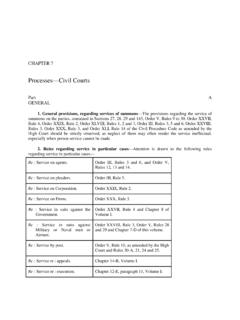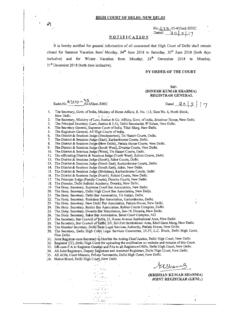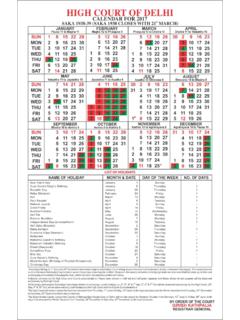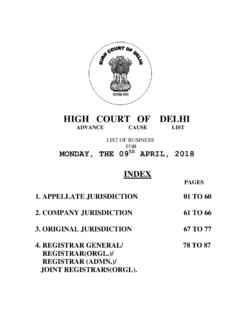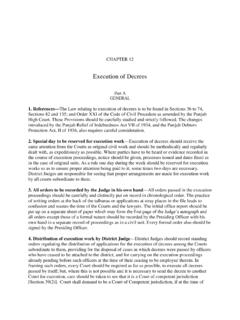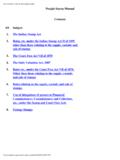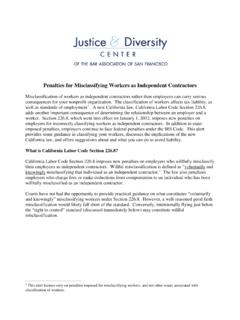Transcription of Ch. 3 Valuation of Suits - Delhi High Court
1 CHAPTER 3 Ch. 3 valuation of suits Part A] Part A GENERAL 1. General It should be remembered that the value of a suit for the purposes of the Court - fees Act, 1870 , and its value for the purposes of jurisdiction are not necessarily identical, and are frequently very different. The value for the purposes of Court -fee is determined by the Court - fees Act, 1870 (as amended), and for purposes of jurisdiction by the Suits Valuation Act, 1887, and the rules, made thereunder. In certain classes of Suits the value for the purposes of Court -fee also can be fixed by rules under Section 9 of the Suits Valuation Act. 2. Part I of Suits Valuation Act extended to Punjab Part I of the Act was extended to this State by Central Government, Home Department, Notification No.
2 210, dated the 20th February, 1889, and the Punjab Government has made rules under Section 3 of the Act determining the value of land and of certain interests therein, for purposes of jurisdiction in the Suits mentioned in the Court - fees Act, 1870 , Section 7, paragraphs (v) and (vi) and paragraph (x), clause (d), which are republished in Part D of this Chapter. 3. Rules under Section 3 of the Act apply to all classes of land in the Punjab No restrictions under Section 3, sub-section (2), of the Suits Valuation Act have been imposed as to the classes of land to which the rules apply, or as to the local extent of their operation, and they apply, therefore to all land generally throughout the State, whether assessed to land revenue or not.
3 4. Land Suits falling under Section 7(iv) or Article 17, 22, Schedule II of the Court - fees Act Section 4 of the Suits Valuation Act provides that, where a suit mentioned in the Court - fees Act, Section 7 paragraph (iv), or Schedule II, Article 17 or 22, relates to land or an interest in land, of which the value has been determined by the rules made under Section 3, the amount and which the relief sought in the suit is valued for purposes of jurisdiction should not exceed the values of the land or interest as determined by those rules. 5. Other Suits under Section 7 of Court - fees Act The Suits falling under the Court - fees Act, Section 7, paragraphs (i), (ii), (iii), (iv), (vii), (viii), (x) (a), (b), and (c); and (xi) (a) to (f), inclusive, are either such as are subject to an ad valorem (according to value) Court -fee in regard to which the value for the purposes of computing the Court -fee and the value for the purpose of determining jurisdiction are under Section 8 of the Suits Valuation Act, 1887, the same; or Suits deals with by direction made by the High Court under Section 9 of the Suits Valuation Act.
4 6. Value of Suits governed by rules made under Section 9, Suits Valuation Act Section 8 of the Suits Valuation Act gives the general rule as stated above, but when the value of a suit for purposes of jurisdiction and Court - fees is determined by rules under Section 9 (ibid), the value as determined by the rules must be accepted. 7. Plaint should show value for purposes of Court - fees and jurisdiction In order to guard against mistakes as to the value of suit for purposes of jurisdiction and of Court - fees , respectively, every plaint ought upon its face to show the value for purposes of jurisdiction as well the value for the purposes of computing Court - fees . The former information is requisite in order that the Court may determine whether the plaint should be returned under Order VII, Rule 10, of the Code of Civil Procedure.
5 When a plaint omits to disclose the value of the suit for the purposes of jurisdiction, the person presenting it should be questioned, and answer recorded on the plaint, unless he consents to amend it then and there. 8. Value in cases governed by Section 7(iv) and Schedule II, Article 17 of the Court - fees Act Special care is necessary with respect to cases falling under the provisions of Section 7, Paragraph (iv) and Schedule II, Article 17, of the Court - fees Act in valuing Suits for the purposes of jurisdiction and Court - fees . A table showing the value of different classes, of Suits for purposes of jurisdiction and Court - fees , following the classification of Suits in the Court - fees Act, has been prepared and attached to this Chapter.
6 It must be clearly understood, however, that this table in itself has no legal force, and that is merely intended for ready reference by the Courts in dealing with questions of value. 9. Value of certain Suits left to judicial decision There is no express provision in the Suits Valuation Act, 1887, in regard to the classes of Suits mentioned below and they do not admit of being disposed of by rules under Part I, nor are they dealt with by directions under Part II of the Act. The Valuation of such Suits , therefore, must be left to judicial decision, as occasion arises. The Suits are: suit for houses; Suits for pre-emption in respect of houses; Suits for removal of attachment of houses; Suits falling under Schedule II, Article 17, Clause (iv), which are not provided for by the rules under Section 3 or directions under Section 9, or by Section 4 of the Suits Valuation Act; Suits falling under Section 7, sub-section (x), clause (d) of the Court - fees Act, and relating to property other than land.
7 10. Fixing Valuation not necessary in certain cases In the case of some classes of Suits or petitions, , Suits under Section 28 of the Sikh Gurdwaras Act, 1925, or petitions under the Guardians and Wards Act, 1890, the law allows no choice as regards the Court in which proceedings must be taken. There is, therefore, no necessity in such cases to fix any Valuation for the purpose of determining jurisdiction. Part B] Part B VALUE OF THE SUBJECT-MATTER OF Suits FOR THE PURPOSES OF APPEAL 1. General Under the Punjab Courts Act, 1918, the number of appeals in a suit and the Court of Appeal are determined partly by the nature of the suit and partly by its value; and serious inconvenience results to Judges of superior Courts, as well as Suitors when the record of the original Court does not disclose the value of the suit.
8 The value of the suit as fixed by the plaintiff or as determined by the Court in the event of its being disputed should, therefore, be always stated on the face of the final judgment and the decree in the suit. The term value , as used in the Punjab Courts Act with reference to a suit, means the amount or value of the subject-matter of the suit. 2. Valuation should be stated in judgment and decree. Meaning of value When the copies filed with the memorandum of appeal do not dispose the value, the Appellate Court should, if in doubt, send for the record, which may show the value. In all cases in which the record does not show the value, the Appellate Court must ascertain and determine whether the value of the suit as instituted (not the value of the subject matter of appeal) does or does not exceed the limits of its appellate jurisdiction.
9 3. Objections as to value When either the appellant or the respondent takes exception to the Valuation determined by the lower Court , the point must be decided like any other point taken in appeal or by way of cross-objection. It should be noted, however, that according to Section 11 of the Suits Valuation Act, no objection as to Valuation can be entertained in appeal unless it was taken in the trial Court before the issue were framed and recorded; or in the lower Appellate Court , in the memorandum of appeal to that Court and unless the Appellate Court is satisfied (for reasons to be recorded in writing) that the suit or appeal was not properly valued, and that the mistake in Valuation had prejudicially affected the disposal of the suit or appeal on merits.
10 This rule applies in all cases of erroneous Valuation except in Suits for accounts where value for purposes of jurisdiction as determined by the Court at any stage shall be final and conclusive and shall not be liable to be contested in appeal or revision (Punjab Act XIII of 1942). In this connection also please see 1952 Punjab 200. 4. Suits for accounts In a suit for the amount found to be due after taking accounts, it is not the tentative Valuation of the plaintiff but the amount found to be due and decreed by the Court , that determines the forum of appeal ( XI Lah. 23). 5. Suits for redemption of mortgage The Valuation of a suit for redemption of mortgaged property is now governed by rules framed under Section 9 of the Suits Valuation Act, 1887.
